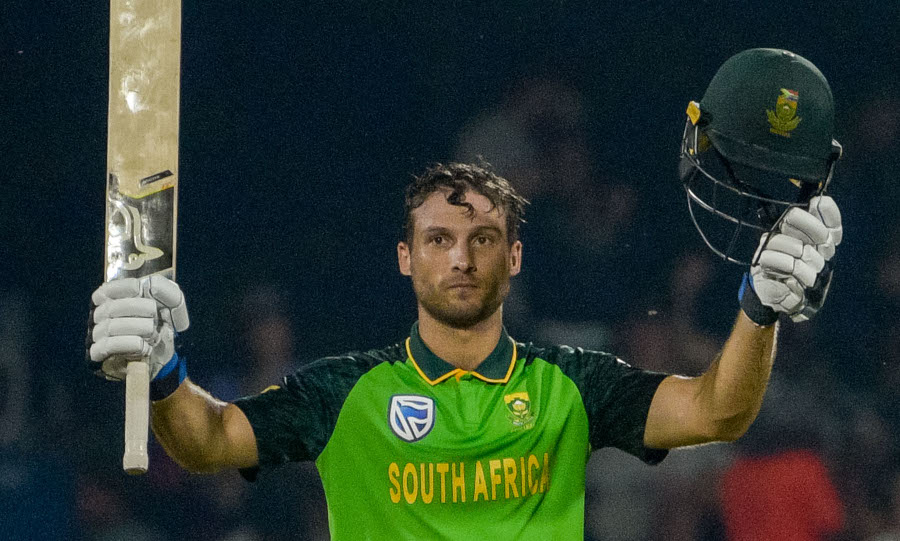Janneman Malan is making consistent statements about his international white-ball competency that demands he be considered in the game’s shortest format. However, with six matches before the World Cup, when and where do you fit him in, asks RYAN VREDE.
Before I dive into the the complexity of the Malan problem, it would be remiss not to note that his unbeaten 177 against Ireland came against, well, Ireland. They are the 12th-ranked ODI side in the world, sitting seven spots below the Proteas.
The feat is notable, but hardly completely surprising. Proteas batters are exponentially more gifted than any of Ireland’s bowlers. It shouldn’t be a contest, and rightfully wasn’t on Friday. The gulf in class is why the Proteas’ defeat in the second ODI was so pathetic and deserving of harsh criticism.
Context matters when appraising a performance. The context informed my view that Faf du Plessis’ 199 against a crippled Sri Lanka attack in the Boxing Day Test last year. It was a fine innings, but not a great one, I wrote at the time.
Similarly, Malan’s innings in Malahide, marked by often breathtaking stroke-making, and beautifully brutal long hitting, is unlikely to rank in his top 10 for reasons beyond the sheer weight of runs at the end of his career.
This is not to say it was insignificant. It gave one greater insight into the calibre of player the Proteas have at their disposal. His technical and mental competency will be examined in greater measure by more skilled opponents in future. However, having watched him through six ODIs, during which time he has scored two centuries and two half-centuries, Malan is undoubtedly more than the sum of his plunder against Ireland.
Expert conditioning and an unrelenting work ethic complements his talent and temperament and, on the evidence of what his coaches and teammates report, that talent is housed in a man who is desperate for self-improvement.
These things combine to make Malan an extremely valuable player for the Proteas, one who’s value must be explored in the T20 format as they seek to build depth, especially with the World Cup looming and pieces of the batting puzzle still missing.
But, how and where?
For Malan to be included in the side for the upcoming three-match T20I series would require the Proteas to continue the selection experimentation that was a feature of the ODI series. Quinton de Kock, David Miller and Kagiso Rabada all missed matches to allow others game time. However, with the T20 World Cup just six matches away, time is not something the Proteas have.
It is also unforeseeable they’ll shift from five specialist batsmen fronting their T20 challenge to accommodate Malan. Two of those five – Temba Bavuma and Quinton de Kock – are selection certainties. Aiden Markram’s form has given him control of another, while Rassie van der Dussen’s consistency is likely to trump some skills deficiencies as a middle-order batsman on slow decks in the selection equation.
An unconventional approach would be to accommodate Malan in David Miller’s spot. This is an extremely unlikely move, given the selectors’ consistency in making like-for-like replacements. Malan is not seen as a middle-order option, with Heinrich Klaasen and Kyle Vererynne pinned as their alternatives to Miller.
A drawn ODI series could diminish the Proteas selectors’ appetite for experimentation, but it shouldn’t. Whoever they field should beat Ireland comfortably. Yet, it stands to reason their psyches are shaken and winning the T20I series emphatically has become a singular focus.
The Proteas are currently heavily reliant on De Kock’s contributions, so resting him for the T20I series is a risk in the context just described. Bavuma seeks confidence and form (he averaged 15.20 against the West Indies), making any considerations of exclusion complex.
Malan’s gap would most likely come either Markram or Van der Dussen sitting out. Again, with just six matches to play before the World Cup, even this may feel like valuable middle time being denied for two near-certain starters.
I’d encourage the selectors to be bold in building the depth they’ll need at the World Cup and beyond. Malan is clearly a fine player, one whose white-ball potency feels like it is only in its infancy. He has something.
There needs to be an investment in that something. Any temptation of making fear-based selections must give way to the reality that they need to find alternatives to the top-order establishment. That starts with giving Malan a run.







